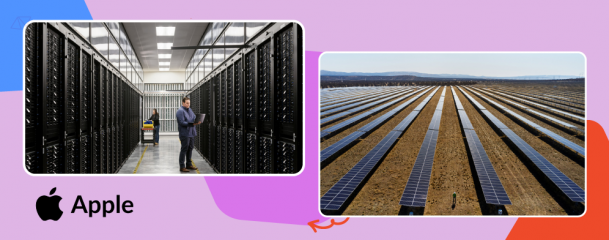Did you know that nearly 40% of millennials consider a company’s sustainability program when it comes to taking up a job? With growing concerns for the environment, it is now becoming critical for organizations to adopt and take corporate sustainability initiatives that focus on people, planet, and profits.
Here are 12 companies who realize the importance of this and have taken some progressive steps toward ensuring they do their bit for the planet.
1. What Is Corporate Sustainability Initiatives?
Corporate sustainability is a business strategy or set of initiatives through funding, employee engagement or volunteership that a company undertakes to make a positive impact in the environment and communities. Such corporate sustainability initiatives are directed towards achieving not just economic but environmental and social goals as well. These could be to reduce carbon footprint, find more sustainable sources for production, use alternate renewable resources like solar or wind power for their operations or to take steps in conservation of ecosystems.
2. Why Should Corporate’s Start Sustainability Initiatives?
Corporate brands are now realizing the importance of creating corporate sustainability initiatives to increase their value. More and more environmentally conscious consumers choose to buy products or services that come from sustainable sources and do not impact the environment negatively.
Sustainability practices can boost a company’s life term by giving them a competitive edge, enhancing their brand image, attracting a loyal customer base, reducing operational costs, and creating new opportunities for success in the long run.
3. What Are the Four P's of Corporate Sustainability?
The four pillars of sustainability focus primarily on human sustainability, social sustainability, economic sustainability, and environmental sustainability. Based on these core elements, corporate sustainability initiatives can range from pollution prevention, resource conservation, LEED certified and green buildings, and ensuring zero emissions.
4. Examples of Businesses with Successful Corporate Sustainability Initiatives
4.1 Astrazeneca
Astrazeneca as a global business in healthcare has embedded corporate sustainability initiatives across its operations to tackle climate change through its environmental strategy that covers ambition zero carbon, product sustainability, and natural resources. By incorporating a circular economy mindset, they aim to conserve energy, source sustainable raw materials and minimize pollution. One of their primary goals is to minimize greenhouse gas emissions from their globally run operations up to 98% by 2026 and reduce the entire value chain footprint by 2030. The company runs efficiency projects that focus on decoupling water use and waste generation.
Their AZ Forest Programme’s strategy is to plant and maintain 50 million trees globally by 2025. They have also optimized all their business operations to include sustainability assessments across processes for API manufacturing, formulation, packaging, and devices.
4.2. Google
Google’s aim is to continue to develop efficient technologies that do not burden existing resources. They became one of the first large-sized companies to declare themselves carbon-neutral in 2007 and the first company to sustain their annual electricity consumption needs through renewable energy sources with an aim to further decarbonize their electricity supply and run on 24/7 carbon-free energy.
Google’s data centers have been designed as efficient operational units that make optimum use of water, energy, and materials, to boost environmental performance and create LEED certified places. Recycled materials have been included in all their Nest and Pixel devices that were launched since 2020. The brand is also tapping into their solar potential through their Sunroof project that enables people to tap into solar energy using their rooftops. Another initiative Google has taken for the community is to map air quality at the micro level across every street to help city planners make more informed decisions and formulate effective health plans.
4.3. Etsy
Etsy has been one of the first few global ecommerce companies to have successfully made 100% offsets in carbon emission in their shipping operations. They have incorporated carbon-neutral shipping messaging to positively impact buying behavior and shopping experience. Besides this, they have made considerable investments in eco-friendly projects that are exploring solar and wind power and green designs to build auto parts.
The brand also supports sustainable small businesses and sells only products that have been made only through ethical processes. In a bid to promote corporate social responsibility, employees can take up to five days annually to spend time in volunteership within their communities. The B corp company’s employees ride bikes to supply compost to organic farms taking it one step further, thereby making Etsy one of the top companies with the best initiative for corporate sustainability.
4.4. Bank of America
Bank of America is dedicated to running their operations more sustainably by tailoring their global business strategy, monitoring activities, managing risks and supporting employees towards achieving their goals.
Through the Environmental Business Initiative, the company has pledged to support the United Nations’ Sustainable Development Goals by deploying $300 billion to low-carbon, sustainable business initiatives. In 2021, Bank of America also announced their goal to optimize all their operations, financial activities and supply chains to achieve carbon neutrality and zero greenhouse gas emissions by 2050.
4.5. Apple

Apple has developed a range of sustainable goals that it supports through programs including climate change support initiatives, smarter eco-friendly products, recycling technologies and more. Apple’s recycling program began in the early 90’s and has become a global initiative in partnership with third-party retailers that comprises recycling centers, offices, and other support facilities that recovers and processes recycled materials.
In support of this, based on the 2021 Apple Environmental Progress Report, it designed the iPhone 12 and Apple Watch Series 6 with 100 recycled rare earth elements, and manufactured MacBook Air with Retina Display using 40 percent recycled materials. Another initiative is to harness the power of clean and renewable energy to run its data centers, support facilities and stores so they can achieve carbon neutrality by 2030.
4.6. Intel
Intel’s has shown its commitment to creating corporate sustainable goals by developing scalable solutions with supply chain and manufacturing partnerships. Their interim milestones that have been set up for 2030 include goals for 100% renewable electricity consumption across operations worldwide.
The organization has decided to Invest approximately $300 million in energy conservation initiatives in order to save 4 billion cumulative kilowatt hours of energy. They also plan to build new centers and factories that are U.S. Green Building Council® LEED® certified. Another recent initiative that Intel undertook was to launch a R&D initiative across industries that will design new abatement equipment and help identify more eco-friendly chemicals with low global warming potential.
4.7. Coca-Cola
Coca Cola’s comprehensive sustainability strategy is centered around the environmental pillar of sustainability. They have identified four key areas that comprise water stewardship, packing and recycling, energy and climate, and agriculture.
Their sustainable packaging strategy is based on the global plastic waste crisis and is designed to create change through a circular economy for all their packaging. The Coca‑Cola water strategy focuses on ensuring sustainable water security using smart water policies, and responsible use of water use across its operations, sourcing processes and communities
4.8. Disney
They also work towards minimizing single-use and other plastics, and recycling. All their serveward and cutlery are compostable so they can be disposed of responsibly using new sorting waste stations at Disney’s Animal Kingdom quick-service restaurants. Organic waste from Walt Disney World is converted into an enriched soil product for use in a composting facility so it can be used to fertilize onsite plants. At Walt Disney World, food and beverage cast members are now wearing brand new aprons made from 100% recycled plastic bottles.
4.9. Nike
Nike’s sustainability program centers on the belief that its “Bloom over Doom” in its support for environmental sustainability initiatives. Nike is part of the Supplier Climate Action Program to ensure their suppliers and manufacturers will help achieve carbon neutrality by 2025. They have also incorporated the concept of circularity in all their future design solutions.
In order to reduce wastage, all their products will be made using recycled and more sustainable material such as Flyleather which has 50% recycled leather scrap composition. They also offer to take charge of cleaning, recycling and donating used Nike athletic gear to nonprofits in order to minimize waste. As an alternative to cardboard, the company is now planning to use reusable shipping totes for packaging to reduce waste as well.
4.10. LEGO

The LEGO group has implemented a wide range of sustainability initiatives in order to help build a more sustainable future for children. Their aim is to use recycled or renewable materials for all LEGO packaging and sustainable materials such as bioplastic for all their core LEGO products by 2030. In order to minimize carbon emissions, the brand has set up two large offshore wind farms, so its operations are 100 percent CO2-neutral.
LEGO Replay is one step forward in a bid to promote a more circular economy. They encourage customers to donate used LEGO bricks to the less privileged. The company has also pledged to plant double the number of trees that were earlier cleared to build a new facility, in order to protect and enhance the quality of life and biodiversity in the local region.
4.11. eBay
eBay has successfully run numerous energy-efficient initiatives across its offices and data centers which in turn has led to a remarkable decline in total Scope 1 and 2 emissions that come directly from the company’s operations. In order to further achieve carbon neutrality, they have purchased carbon offsets.
Another goal is to ensure that all their electricity consumption is provided through renewable energy sources in the offices and data centers. By installing efficient toilets and faucets to conserve water, eBay manages to reduce water wastage.
4.12. Bosch
One of the major focus areas for Bosch’s sustainability goals is reduction in carbon emissions that arise from onsite operations. The company has made strides to be certified as Scope 1 and 2 Carbon Neutral by adopting energy efficient processes and using renewable sources of energy. They also added carbon offsets to mitigate the damage caused due to unavoidable emissions.
Bosch is now expanding their focus on supporting ecosystems that influence emissions by trying to reduce upstream and downstream emissions by 15 percent in absolute terms by 2030 in Scope 3. To further ensure this is done with utmost dedication, all suppliers will be evaluated on the criteria of climate action activities before they are awarded contracts.
 Interested in Virtual Team Building Events?
Interested in Virtual Team Building Events?





















